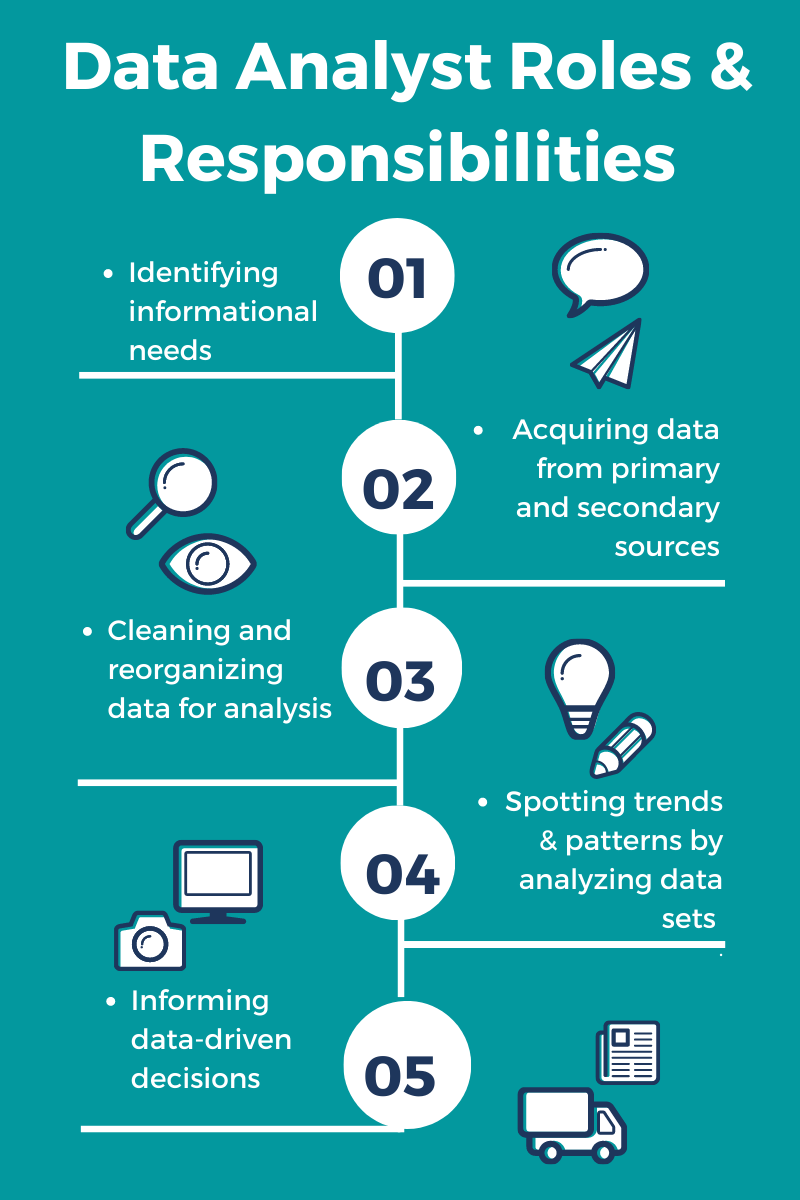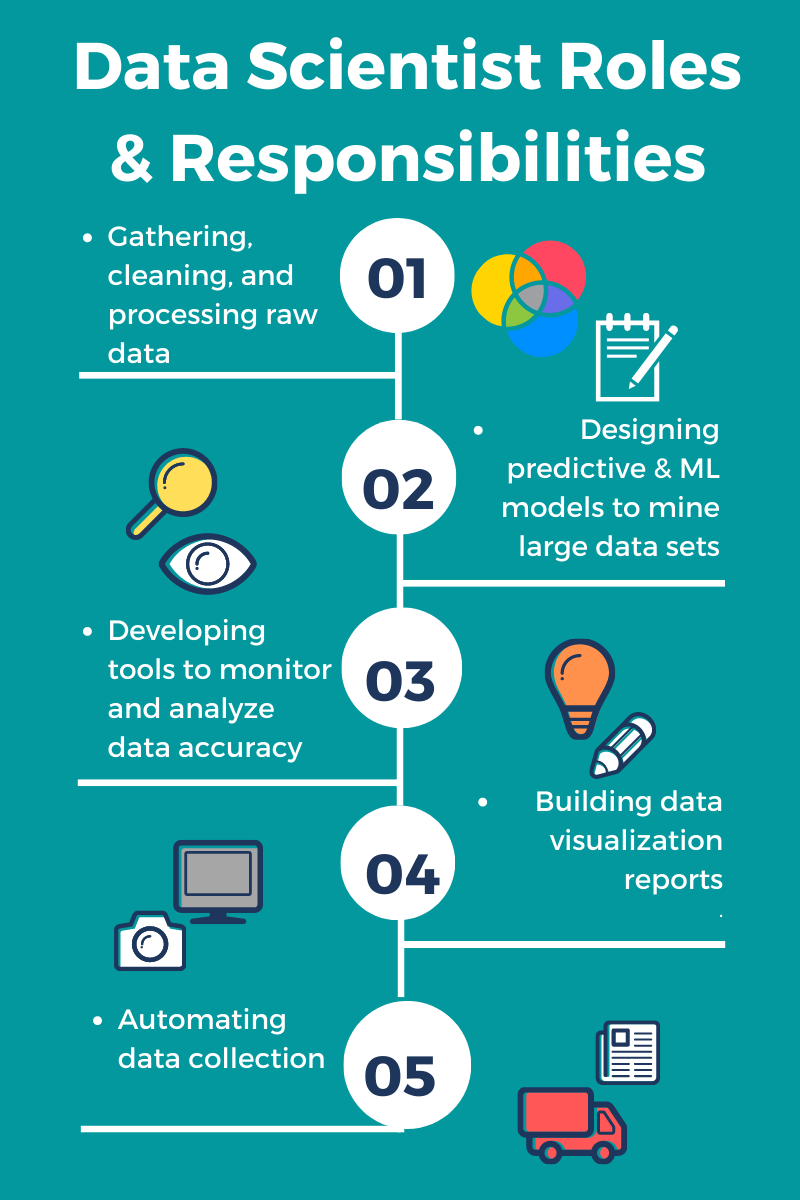Data plays a significant role in modern society. Businesses, for instance, analyze data to improve strategies by reducing wasted money and time. Likewise, it is essential for research of any kind, as researchers need data to prove or disprove theories and expand knowledge around specific topics or problems. Similarly, it is also crucial for economic growth, as economic data provide an empirical basis for research and decision-making to economic policies.
As a result, there is a high demand for data scientists and analysts in the market, with salaries above the national average. The World Economic Forum Future of Jobs Report 2020 also lists these roles as number one for increasing demand across industries.
So data analyst vs data scientist- what is the difference? Well, both data analysts and data scientists work with data. The difference is what they do with it.
What Does a Data Analyst Do?
 The first thing to remember is that the responsibilities of a data analyst vary between industry and company. But fundamentally, a data analyst identifies trends by gathering data to help businesses make strategic decisions. Firstly, they analyze data sets to answer important business questions, such as why a given quarter saw a drop in sales, why certain marketing campaigns fared better in certain regions, and how internal attrition affects revenue, among others.
The first thing to remember is that the responsibilities of a data analyst vary between industry and company. But fundamentally, a data analyst identifies trends by gathering data to help businesses make strategic decisions. Firstly, they analyze data sets to answer important business questions, such as why a given quarter saw a drop in sales, why certain marketing campaigns fared better in certain regions, and how internal attrition affects revenue, among others.
Secondly, data analysts also perform statistical analyses to solve problems. Subsequently using tools and programming languages such as SQL, R and SAS, Power BI, and Tableau among others, data analysts make database queries and clean or convert data into usable formats by discarding irrelevant information. Likewise, data analysts also deal with missing data using different methods based on the type of missing data and available datasets.
Similar to many other work teams, data analysts, with a range of fields and titles, also typically work in a company’s interdisciplinary team. A data analyst’s many titles include database analyst, market research analyst, business analyst, financial analyst, operations analyst, customer success analyst, pricing analyst, and international strategy analyst.
Likewise, skills include technical expertise and the ability to communicate quantitative findings to non-technical colleagues or clients. Moreover, data analyst talents also include data mining/data warehousing, modeling, statistical analysis, and database management.
What Does a Data Scientist Do?
To begin with, a data scientist develops tools and methods to extract organizational information to solve complex problems. In other words, a data scientist designs data modeling processes and creates algorithms and predictive models to automate systems and data frameworks. Consequently, data scientists also make business estimations by writing algorithms and building statistical models. They do so by gathering, cleaning, and processing raw data. Moreover, data scientists also design predictive models and Machine Learning algorithms to mine large data sets.
information to solve complex problems. In other words, a data scientist designs data modeling processes and creates algorithms and predictive models to automate systems and data frameworks. Consequently, data scientists also make business estimations by writing algorithms and building statistical models. They do so by gathering, cleaning, and processing raw data. Moreover, data scientists also design predictive models and Machine Learning algorithms to mine large data sets.
Additionally, the role of a data scientist also includes arranging cluttered data sets using multiple tools simultaneously to build automation systems and frameworks. Thus, data scientists require business intuition and critical thinking to understand data’s implications.
Similarly, a data scientist possesses mathematical and statistical knowledge as well, and uses these skills to approach problems in innovative ways. In particular, data scientists must have skills in Machine Learning (ML), software development, Hadoop, Java, data-mining/data-warehousing, data analysis, Python, and object-oriented programming.
In like manner, data scientists are also responsible for the development of tools used to monitor and analyze data accuracy. By the same token, they also build data visualization reports and automate the data collection process.
Skill Comparison
| Data Analyst | Data Scientist | |
| Mathematics | Foundational Math, Statistics | Advanced Statistics, Predictive Analytics |
| Programming | Essential knowledge of R, Python, SQL | Advanced object-oriented programming |
| Software | Excel, SAS, Business Intelligence Software | Hadoop, TensorFlow, Spark, MySQL |
| Other | Data Visualization, Analytical thinking | Machine Learning, Data Modelling |
Differences
| Data Analyst | Data Scientist |
| Firstly, a data analyst does not usually require a business acumen or advanced data visualization skills | A data scientist, on the other hand, requires business acumen and data visualization skills to convert insight into business stories |
| Secondly, data analysts tend to usually look at data from a single source, such as the CRM system | On the contrary, a data scientist explores and examines data from multiple disconnected sources |
| In like manner, a data analyst’s role is to answer business questions | A data scientist though, formulates the questions whose solutions will benefit the business |
| Data Analysts, likewise, do not need hands-on Machine Learning (ML) experience or experience building statistical models | In contrast, the core responsibilities of a data scientist include Machine Learning (ML) and building statistical models |
| Finally, data analysts use analytical techniques at regular intervals and present reports routinely | Data scientists, however, deal with data frameworks and automate tasks to solve complex problems |
In conclusion, when it comes to the difference between a data scientist vs data analyst, the data scientist is the one responsible for creating and maintaining the tools necessary to crawl and collect the data. A data analyst then examines that data to make important predictions. Both simultaneously play an important role in aiding businesses to leverage the full potential of AI.
Besides, if you want to read about how applications of AI can help modern businesses, you can check out our previous blog: 10 Benefits and Applications of AI in Business.
The Fuse.ai center is an AI research and training center that offers blended AI courses through its proprietary Fuse.ai platform. The proprietary curriculum, likewise, includes courses in Machine Learning, Deep Learning, Natural Language Processing, and Computer Vision. These certifications consequently help engineers become leading AI industry experts.

